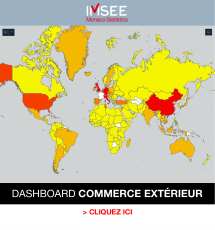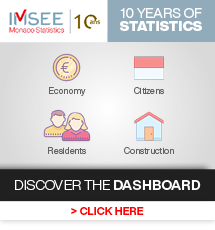
- Homepage
- About Monaco Statistics
- Code of practice
Code of practice
The objective of this code is to lay down ethical principles to be used as reference by Monaco Statistics staff in the conduct of their duties.
The drafting, dissemination and application of such as code contribute to ensuring the quality and credibility of the statistics produced and disseminated by Monaco Statistics, by enshrining the principles of independence and integrity.
It is thus aimed at:
- Monaco Statistics ’s staff to provide them with a baseline of principles, values and good practices in the field of statistics, designed to produce and disseminate good quality harmonised statistics
- Data providers to guarantee the confidentiality of data provided and the fact that no excessive requirements will be imposed on them
- To users to guarantee the impartiality of the Institute and to reassure them that the statistics produced and analyses conducted are objective and reliable
Principle 1: Statistical confidentiality - Respect for privacy or confidentiality of the affairs of data providers (Government Departments, Municipality, public and private legal entities, households), confidentiality of information provided and the use of them strictly for statistical purposes are rigorously guaranteed by Monaco Statistics.
Principle 2: Impartiality and objectivity - Monaco Statistics undertakes to produce and disseminate statistics which respect scientific independence and in a professional, transparent and objective manner, with equal treatment afforded to all users.
Principle 3: Professional independence in respect of choice of methods – The credibility of Monaco Statistics ’s statistics is guaranteed through professional independence in the choice of methods by the Institute, towards other administrative or political departments and bodies and towards private sector operators.
Principle 4: Sound methodology and appropriate statistical protocols – Monaco Statistics undertakes to produce good quality statistics based on a sound methodology using the appropriate procedures, competencies and tools. The Institute also undertakes to base its statistics on adequate procedures, from data collection to data validation. The CSSEE may give its opinion on the suitability of methods used.
Principle 5: Non-Excessive Burden on Respondents – The reporting burden is limited and proportionate to the needs of Monaco Statistics. It should not be excessive for respondents.
Principle 6: Cost effectiveness – Monaco Statisticsstrives to use its resources effectively.
Principle 7: Relevance – Monaco Statisticsstrives to take into account the needs and expectations of private and public sector users when producing its statistics.
Principle 8: Accuracy and reliability – Monaco Statisticsundertakes to produce statistics which accurately and reliably portray reality.
Principle 9: Timeliness and punctuality – Monaco Statisticssees to it that its statistics are disseminated in a timely manner and in accordance with a tentative timetable for publication made public.
Principle 10: Consistency and comparability – Monaco Statistics sees to it that it produces statistics which are consistent internally and over time and focuses on the creation of long series.
Principle 11: Accessibility and clarity –Monaco Statistics ’s statistics will be presented in a clear and understandable form, released in a practical and suitable manner, available and accessible to all. As far as possible, they will be accompanied by metadata, explanations and definitions.
Principle 12: Continuous improvement – Monaco Statistics sees to the alignment and continuous improvement of human, material, methodological and technological resources used for the production of national statistics.





- 12 September 2025 Barometer Retail trade : July 2025
- 12 September 2025 Barometer – Manufacturing industry : July 2025
- 17 September 2025 Quaterly Economic Report Q2 2025
- 24 September 2025 Focus : Wholesale trade 2024
- 10 October 2025 Focus : Transportation and storage 2024
